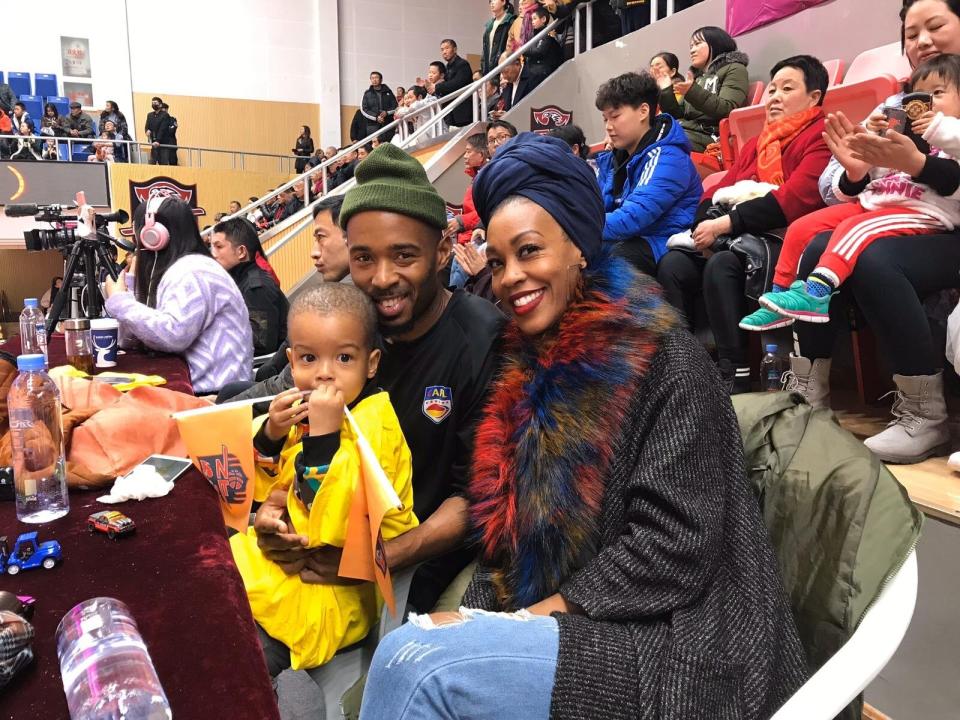Border Closures Separate Mother From 3-Year-Old Son Amid Coronavirus Crisis
Imani Bashir thought she’d seen it all.
A 33-year-old American freelance travel writer who has been to over 30 countries in the last four years, Bashir is an expert in navigating the ins and outs of travel vouchers, or obtaining an emergency passport for your newborn son.
But in the last few weeks, Bashir, mother to a 3-year-old, found herself in a situation she’s never been in before.
As world leaders try to contain the outbreak of COVID-19, countries across the globe are rapidly shutting down their borders. More than 130 countries have implemented new severe travel restrictions including reducing entry and exit for foreign nationals and citizens and enforcing heightened screenings at all points of entry ― all in efforts to contain the novel coronavirus, which causes COVID-19, from spreading.
Last week, the U.S. State Department issued a Level 4 Travel advisory that urged Americans not to travel overseas and to return to the United States if they can. The advisory came weeks after the Trump administration announced further travel restrictions, including the suspension of travel between Europe and the U.S. and Mexico and the U.S.
Consequently, there are thousands of Americans stranded in countries across the globe by these border closures. Students studying abroad, tourists on vacations and expatriates like Bashir have found themselves in limbo, unable to return home.
“It’s the most surreal thing because we lived in the center of this while it was developing and before it had a name,” Bashir told HuffPost. “For it to follow us, it’s so depressing and it’s so stressful.”
Last year, Bashir and her family moved to Wuhan, China ― where the virus was first detected late last year ― after her husband, an international football coach, was hired to train the Wuhan Gators. The family was on vacation in Malaysia during the Chinese New Year when Bashir received a text from her landlady warning her of a new type of pneumonia that was spreading, later to be confirmed as COVID-19, infecting those in the area.
It became clear that Bashir and her family could not return to Wuhan. The family gave up their home and all their belongings there, and were left with with just their vacation luggage.
“That’s one thing that a lot of people really don’t understand because they’ve just been in one place dealing with [the outbreak]” said Bashir. “But for us, this has been since December 2019.”

In late February and nearly a month after being stranded in Malaysia, Bashir’s husband went to the Czech Republic with their son, where he took a job coaching another football team. Bashir went to the U.S. for several speaking engagements. The plan was for Bashir to join her husband and son in the Czech Republic.
As Bashir wrapped up work in the U.S., the number of cases skyrocketed. Businesses had shuttered their doors and airlines canceled flights left and right. In early March, the Czech Republic announced that it would no longer allow foreigners to enter the country.
Bashir, who was still in the U.S. at the time, began to panic. She realized she needed to leave sooner if she wanted to be with her husband and son. On March 16, Bashir left for the Czech Republic, with a layover in Amsterdam.
But during her layover in Amsterdam, she was told she was too late and could not board a flight to the Czech Republic. The country’s temporary ban on foreigners entering the country had gone into effect and Bashir had no paperwork proving her husband was inside the country.
Bashir broke down in tears. She knew she needed to make a decision and quickly. She was worried more countries would shut down their borders and she’d be stranded indefinitely.
“I cried a lot,” she said. “But when you’re in the midst of traveling, you just have to figure it out as you go along because, for me, then time was of the essence.”
She moved quickly and bought a ticket to London, where she had relatives whom she could stay with.
Bashir is working on how to reunite with her husband and son. It’s been nearly a month since she last saw them. She talks to them on FaceTime every day, trying to reassure her son, who is distraught without her. Her husband is now out of work, as the pandemic put the football season on hold. Since his contract stipulates his employer provides housing, it also means he and his son will be out of a home soon.
Bashir is currently working on trying to bring her husband and son to London, in hopes of reuniting and being away from the outbreak that has followed her family since the very beginning.
“As far as getting to my husband and my son, I will risk my life for that,” said Bashir. “Getting them to me is the most important thing right now.”
Related...
Displaced Families Tap Into Survival Instincts To Tackle COVID-19 Outbreak
A HuffPost Guide to Coronavirus
Read our live blog for the latest updates from HuffPost reporters around the world
The world is facing a crucial test this week in flattening the curve
8 things people diagnosed with coronavirus want you to know
Doctors answer the most common coronavirus questions
Health care workers are struggling with a shortage of protective gear
27 comfort shows to watch while self-isolating
10 ways to practice solidarity while social distancing
What coronavirus questions are on your mind right now? We want to help you find answers.
Love HuffPost? Become a founding member of HuffPost Plus today.
This article originally appeared on HuffPost.

